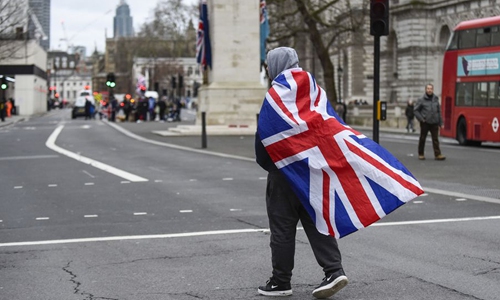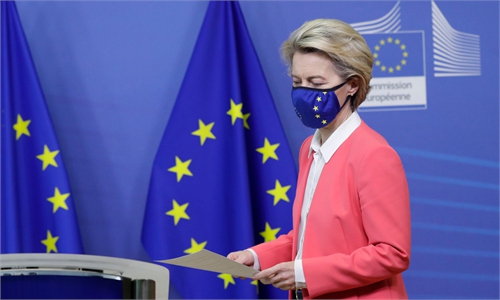
A supporter of a pro-Brexit group walks down Whitehall in London, Britain, on Jan. 31, 2020. (Photo/Xinhua)
Britain and the European Union were expected to announce a Christmas Eve trade deal Thursday after ten months of Brexit talks dragged out over yet another late night session.The two sides had hoped to unveil the accord on Wednesday, and the front pages of several British newspapers already proclaimed victory for Prime Minister Boris Johnson.
But EU member states had a number of questions about the text and cross-Channel diplomacy continued through the night, with Johnson and Commission chief Ursula von der Leyen expected to announce a breakthrough shortly after dawn.
"It will hopefully be an early start tomorrow morning," European Commission spokesman Eric Mamer tweeted just after midnight, advising reporters and diplomats alike to grab some sleep as the finishing touches were applied.
Several hours earlier, European officials had confidently told journalists, "We are in the final phase."
But diplomatic sources said member states, in particular France, had wanted the Commission to go back to the British camp to seek specific guarantees on parts of the accord.
A French government source said UK negotiators had made "huge concessions" on fisheries, the key sticking point as the clock ticks down to Britain's departure.
The last-gasp deal, if it is confirmed, would come just days before Britain is set to leave the EU's single market at the end of the year, sparing the two sides from trade tariffs.
A deal - which would still need to be translated and tidied up by lawyers - could be approved provisionally before the cut-off date and then scrutinized by EU lawmakers in the new year to avoid a cliff-edge.
The focus in talks had shifted since Monday to cross-Channel calls between Johnson and von der Leyen after exhausted officials failed to close the gap on how to share access to UK fishing waters.
The remaining differences between the two camps were narrow but deep, in particular over fishing, with EU crews facing a dramatic cut in their catch from British waters.

